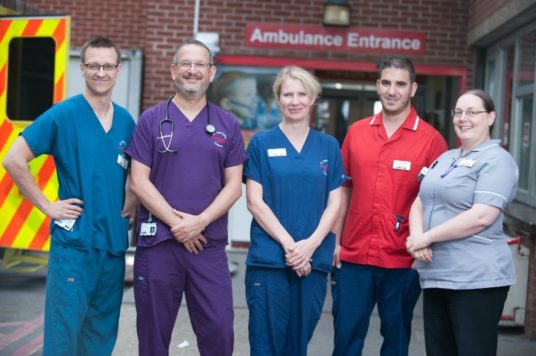St George’s sees outstanding research results
St George’s is in the top 10 Trusts in England for participation in life science industry research.
St George’s placed seventh overall with a total of 1,022 participants in life science industry research studies between April 2017 and March 2018. This compares to 379 patients in 2016/17, representing a 170% increase.
Life science industry studies – such as those sponsored by pharmaceutical companies – not only improve treatments for patients but continue to make the UK a global centre for healthcare research.
Results from St George’s reflect a trend across the country where more people than ever were able to take part in high quality life sciences industry research and access cutting edge treatments. The NIHR recruited over 50,000 participants to health studies sponsored by the life sciences industry – an increase of 45% on the 35,000 participants in 2016/17.
Overall, St George’s saw an increase of 29.9% of participants into clinical research studies to 6338 from 4880 in the previous year. St George’s also increased the overall number of open studies to 238, up by 10.7%, compared to 215 the previous year.
Dr Daniel Forton, Consultant Hepatologist and Associate Medical Director for Research at St George’s, said: “I am delighted that the hard work by so many of our medical, nursing and research support staff is being recognised.
“Most of all I am very pleased that so many patients are able to access new and novel treatments because our Trust is collaborating effectively with commercial organisations such as pharmaceutical companies.
“There are many examples where our patients have been able to access life transforming treatments through this route before they become routinely available on the NHS.”
The new annual performance figures were published by the National Institute for Health Research (NIHR), the health body responsible for supporting and facilitating clinical research studies across England.
Mary Ryan, 68, has benefited from taking part in clinical research – specifically in the PISTE trial – after having a stroke. The stroke had paralysed the right side of her body leaving her unable to talk.
She said: “The drug [they were using] wasn’t working and they had an experimental procedure they said they could use.
She added: “They inserted a tube in my groin and said lie very still; they whipped out the clot and immediately I could talk again. By the end of the day I was getting some movement back in my arm and leg. I play the piano and within a week I was reasonably competent at doing that again; after a major stroke!”
Jonathan Sheffield OBE, NIHR Clinical Research Network Chief Executive, said: “Health research is the key to finding new and innovative cures, treatments and care for patients. Evidence also shows research active organisations consistently deliver better outcomes to all patients they treat, not just those involved in health research trials.
“We aim to ensure research is embedded in all aspects of care delivered in England. We also wish to provide an opportunity for anyone to be involved in a health research study. With nearly three quarters of a million participants in the last year we are moving closer to achieving this.”
Notes to editors
For more information from St George’s, please contact Pippa Harper, Media Manager, via 020 8266 6128 or Philippa.Harper@stgeorges.nhs.uk
For more information from NIHR, please contact Tom Bragg, Communications Manager, NIHR Clinical Research Network South London, via 020 7188 8484 or Tom.Bragg@gstt.nhs.uk
For further information, visit the NIHR website www.nihr.ac.uk/research-and-impact/nhs-research-performance/league-tables/



